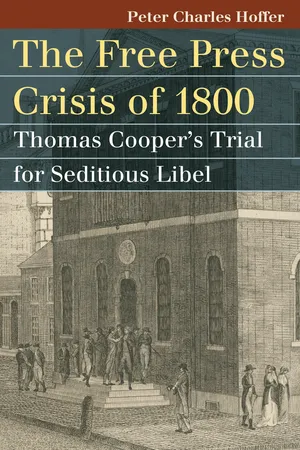
The Free Press Crisis of 1800
Thomas Cooper's Trial for Seditious Libel
- 166 pages
- English
- ePUB (mobile friendly)
- Available on iOS & Android
About This Book
The far-reaching Sedition Act of 1798 was introduced by Federalists to suppress Republican support of French revolutionaries and imposed fines and imprisonment "if any person shall write, print, utter or publish... scandalous and malicious writing or writings against the government of the United States." Such a broadly and loosely defined offense challenged the freedom of the American press and gave the government the power to drag offending newspaper editors into court. The trial of Thomas Cooper in particular became an important showcase for debating the dangers and limits of the new law, one with great implications for both the new republic and federal constitutional law.
Cooper's trial has now been rescued from long neglect and illuminated by Peter Charles Hoffer, one our nation's preeminent legal historians. While most modern students of the Sedition Act regard it as an extreme measure motivated by partisan malice, Hoffer offers a much more nuanced view that weighs all the arguments and fairly considers the position of each side in historical and legal context.
Hoffer sets the stage by revisiting both the much better known 1735 trial of Peter Zenger and the subsequent fashioning of the First Amendment during the first meeting of the U.S. Congress. He then describes the rise of political factions in the early republic, congressional debate over the Sedition Act, and Thomas Jefferson's and James Madison's Kentucky and Virginia Resolves. After a close reading of Cooper's allegedly seditious writings, Hoffer brings the trial record to life, capturing prosecution and defense strategies, including Cooper's attempt to subpoena President Adams and Federalist trial judge Samuel Chase's management of the prosecution from the bench. Long after the Federalists had departed the scene, echoes of the free-press crisis continued to roil American politics—reappearing in the debates over antislavery petitions, the suppression of dissent during the Civil War and two world wars, and most recently in the trials of suspected terrorists.
Hoffer's book is an authoritative review of this landmark case and a vital touchstone for anyone concerned about the role of government and the place of dissent in times of national emergency.
Frequently asked questions
Information
Table of contents
- Front Cover
- Half Title
- Series Page
- Title Page
- Copyright Page
- Table of Contents
- Preface
- Acknowledgments
- Prologue: The Pursuit of Benjamin Bache
- 1. From the Zenger Case to the First Amendment
- 2. The Federalists Pass a Sedition Act
- 3. Thomas Jefferson and James Madison Lead a Protest
- 4. Thomas Cooper’s Turn Comes
- 5. Freedom of the Press on Trial
- 6. The Unforeseen (and Unintended) Consequences of the Sedition Act Crisis
- Conclusion: The Paper Barriers
- Chronology
- Bibliographical Essay
- Index
- Back Cover